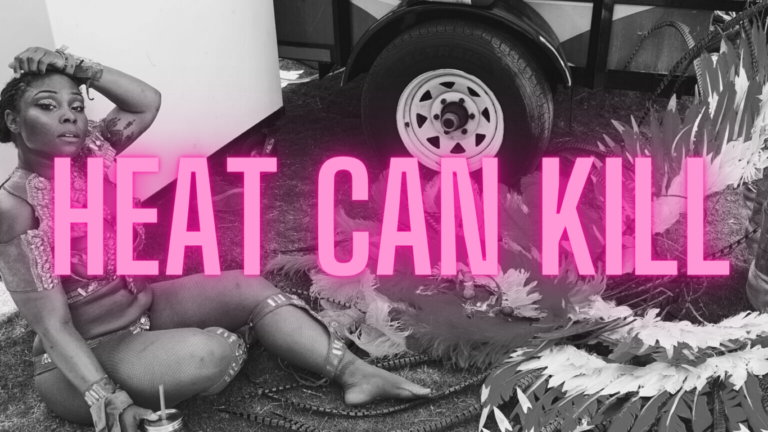AWM, PA-C here! I have been in medicine since 2003 and certified as a physician assistant since 2013. Carnival season is heating up (pun intended), and we have to talk about how to keep us healthy and safe. No one talks about it, but the risk of heat injury is very real.
To prepare you, I will talk about some heat injuries, conditions that leave you at risk, and tips to help keep you safe.
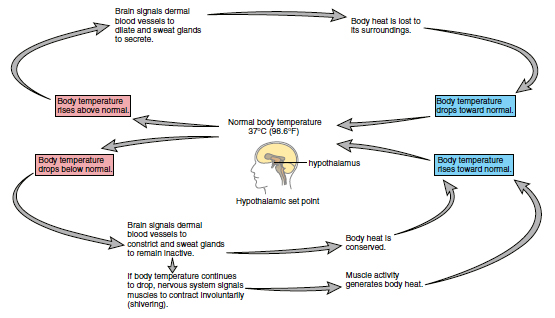
How your body regulates heat
Your magical body works hard to regulate your body temperature by sweating.
Say thank you to a small part of your brain called the hypothalamus, which acts as a command center for many body functions. It acts as a thermostat that reacts to stimuli within and outside your body to regulate your temperature. Skin, sweat glands, and blood vessels function as vents, condensers, and heat ducts of your body’s heating and cooling system.
Your middle layer of the skin (dermis) stores most of your body’s water. Heat activates the sweat glands, which bring water and salt to the surface of the skin, causing evaporation to cool the body. Your blood vessels also dilate, which helps remove heat from your core.
Environmental factors of Heat Injury
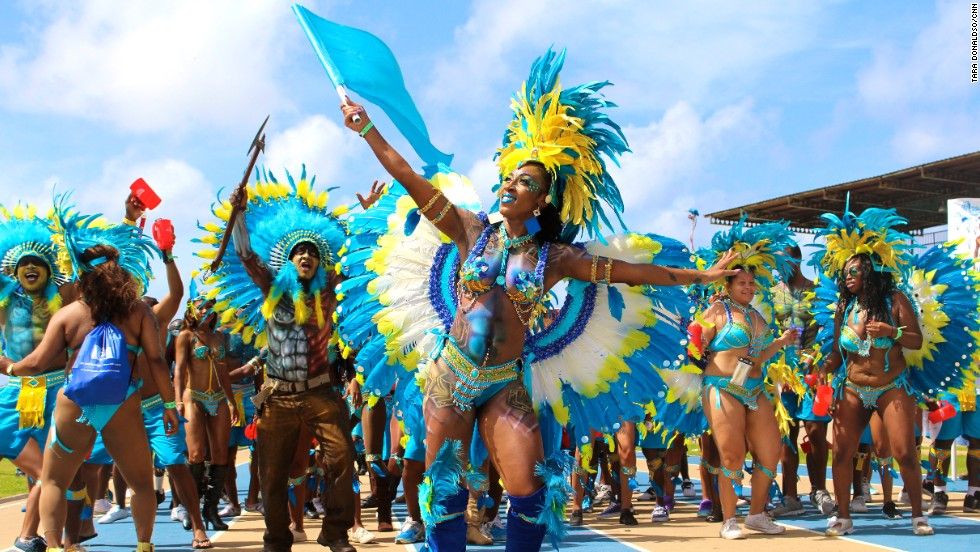
Participation in the Caribbean Carnival means being outside. Air temperature, relative humidity, heat from the sun, air movement (wind), and conductive heat from the ground (sidewalk/road) all come into play.
Some of the worst scenarios would be high pavement temperatures, poor shade, low wind and high humidity.
Humidity is when surrounding air cannot hold water vapor. This causes sweat to evaporate slowly, if at all. And so, if evaporation does not occur, your body temperature increases. This is why you feel so much hotter in environments of high humidity.
Personal factors of heat injury
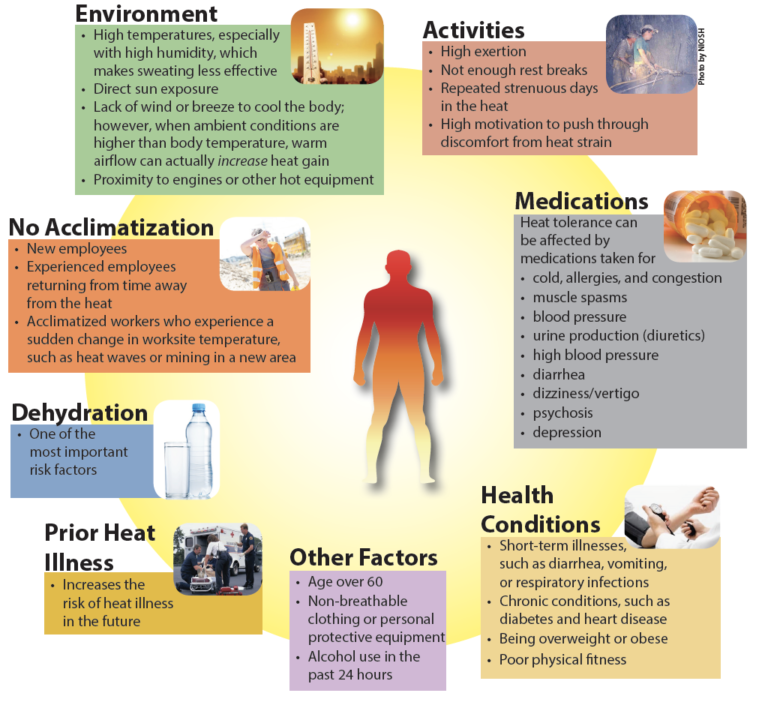
Those at the highest risk of heat-related diseases are considered clinically overweight, currently ill, and taking certain medications. Chronic diseases and other factors include fever, heart disease, and poor circulation. Age (over 60) and fitness level are also important. Furthermore, if you have had a heat injury before, it is more likely to happen again.
Some medications leave you susceptible to sunburn:
- Tetracyclines – Doxycycline, Minocycline
- Fluoroquinolones – Ciprofloxacin (Cipro), Gemifloaxin (Factive), Levofloaxin (Levaquin), Moxifloacin (Avelox) Ofloxacin (Floxin)
- Sulfonamides – Sulfadiazine, Sulfamethazine,
- Antifungals
- Calcium Channel Blockers
- Diuretics
- Oral Contraceptives
- Sulfonureas (Sulfa-drus)
- Statins, Tricyclic Antidepressants
- Ibuprofen, Naproxen
- Antihistamines
- St. John’s Wart
Medications known to cause heat exhaustion and heat stroke include:
- Migraine Medications
- Vasoconstrictors
- Tricyclic antidepressants
- Phenothiazine Anticholinergics
- beta-blockers
- ADHD medications
- Diuretics
If you take medications, chances are they fall into some of these categories. My recommendation is to talk to our doctor to get advice on how to stay safe and healthy while participating in Carnival.
Alcohol consumption predisposes revelers to heat injury by slowing down the hypothalamus and lowering its ability to regulate body temperature. In addition, alcohol reduces the release of a hormone called vasopressin in the body, which regulates body fluids. Alcohol is also a diuretic, which leads to dehydration.
Types of Heat Injury
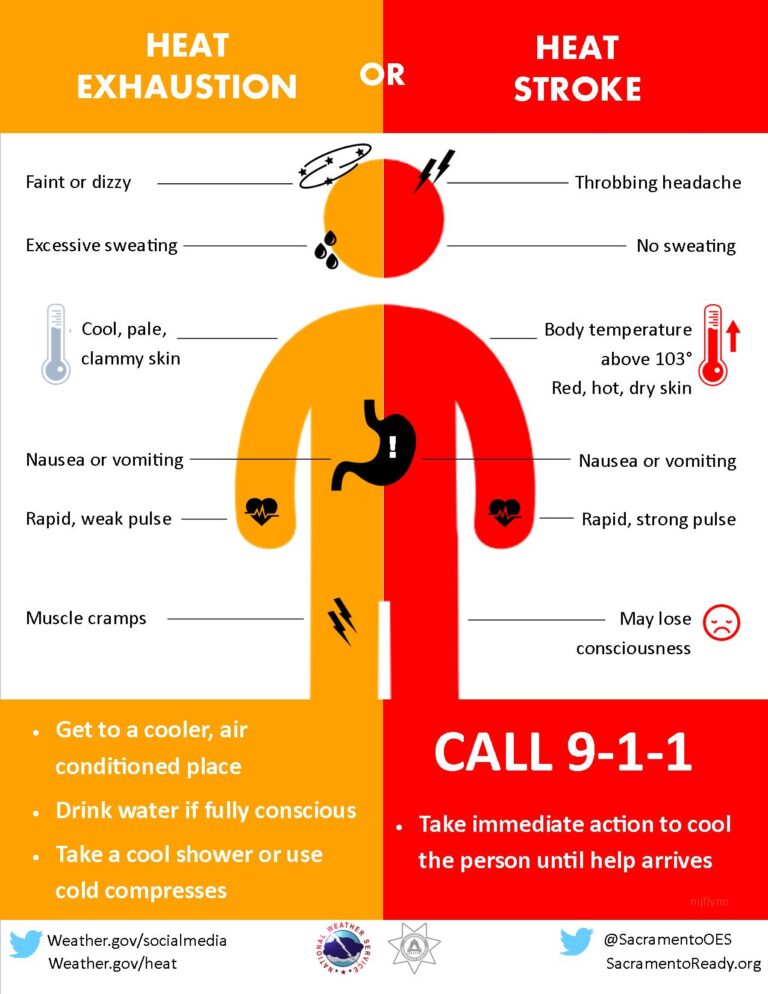
Heat Exhaustion
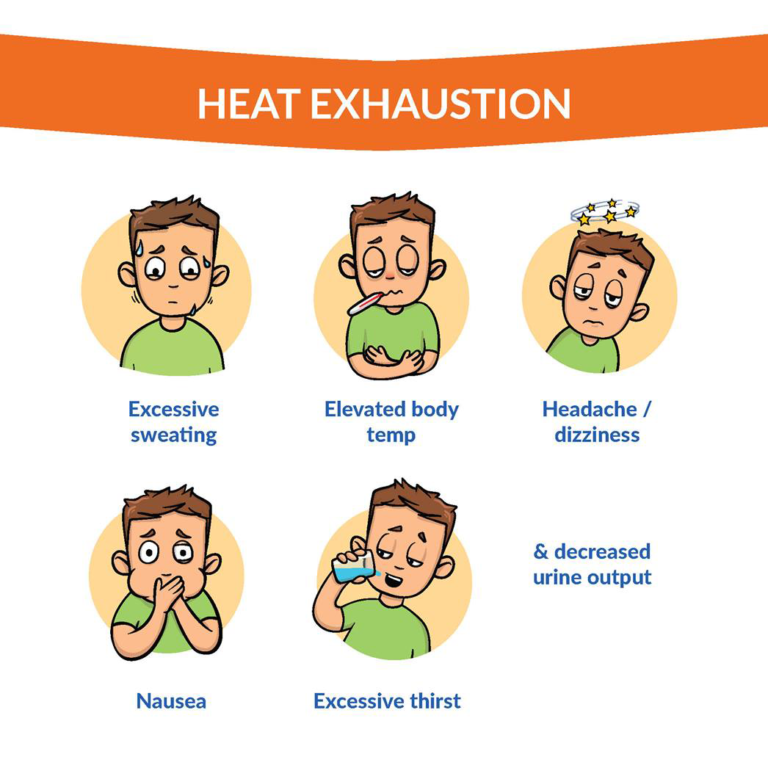
Heat exhaustion is the body’s reaction to excessive water and salt loss, usually through sweating.
As shown above, symptoms of heat exhaustion include:
- Headache
- Nausea
- Dizziness
- Weakness
- Irritability
- Thirst
- Heavy sweating
- Elevated body temperature
- Decreased urine output
To treat this, you should immediately remove yourself from the elements and drink a lot of fluid, preferably with electrolytes. Eat something light if possible, and rest in a shaded area. Anything too heavy will therefore cause vomiting if you are already nauseated. If cold compresses are available, apply them to the neck, forehead, groin, and armpits. Fainting is possible with heat exhaustion; so get emergency services involved immediately.
Heat Stoke
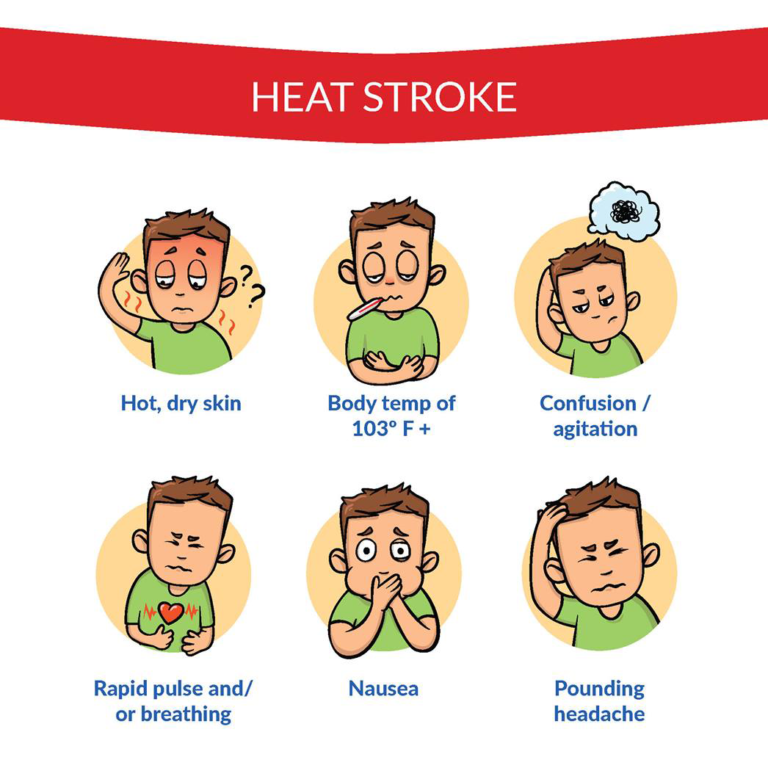
Heat stroke is the most severe heat-related illness. It occurs when the body becomes unable to control its temperature: its temperature rises rapidly, the sweating mechanism fails, and the body cannot cool down. As a result, the body temperature can rise to 106 ° F or higher within 10 to 15 minutes. Heat strokes can therefore lead to death or permanent disability if emergency treatment is not given.
As shown above, symptoms of heat stroke include:
- Confusion, altered mental status, slurred speech
- Loss of consciousness (coma)
- Hot, dry skin or profuse sweating
- Seizures
- Very high body temperature
Reduce your risk of heat injury
Before I get into this, I want to tell you that heat injury can happen to anyone, despite your good health and fitness level. If you travel to Carnival, you are already at a disadvantage because you have little time to acclimatize to the environment.
- Talk to your primary care manager (PCM) and discuss which medications and diseases you are at risk.
- If you are on a medication that causes sunburn, wear sunscreen and reapply OFTEN.
- If you have suffered a heat injury before, talk to the band about their emergency protocols. If they are a much smaller band, they can also watch you and make sure you stay cool. Communication is key.
- Pack a portable fan. I have one that doubles as a fan, flashlight, and cellphone charger.
- Most carnival crews are in team-no-sleep mode. But sleep is a therapeutic process that repairs the cells in your body. If you aren’t sleeping, your risk of heat injury increases.
- Limit your alcohol intake. I can hear it now! YEAH RIGHT! Okay, but seriously, remember how alcohol affects your hypothalamus. The more alcohol you drink, the more it prevents your brain from controlling your body temperature.
- Drink plenty of fluids and eat! “Salt follows water,” so you lose salt and precious electrolytes when sweating. Coconut water, Gatorade, and electrolyte packets help restore what is lost.
- Most importantly, listen to your body! Don’t try to stick it out for anyone. If you notice signs or symptoms, treat yourself accordingly.
- Get out in the elements and exercise. Prepping your body for similar stress will reduce your risk.
In conclusion, be safe!
Carnival is a lot of fun, but there are definitely some risks to your health. I hope this raises awareness and encourages you to take some health safety measures!
Side note, the weather for the Atlanta and Atlanta Dekalb Carnival is typically pretty hot and very humid. Be safe! Above all, HAVE FUN!

